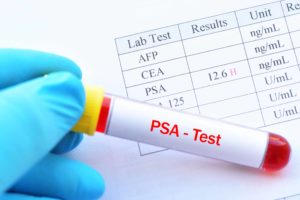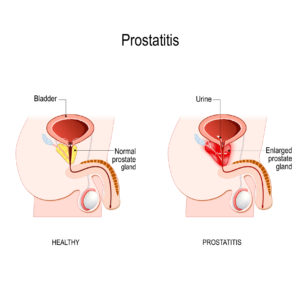
What is the PSA test?
With prostate cancer being the second leading cause of death in men and the second most common cancer in men, it is vitally important for men to know their PSA number. Knowing this number will help determine whether you have cancer of the prostate, a walnut-sized gland enfolding the duct leading from the bladder to the penis. The test measures how much of a protein essential to human reproduction, PSA (prostate-specific antigen), is in your blood. The PSA's job is to turn your viscous pre-semen into a liquid, consequently energizing the sperm.
Your prostate makes this PSA all the time, so a small amount of the protein (usually resulting in a reading of less than 4 ng/mL) is normal. Because cancer cells produce extra PSA, a higher reading may serve as a warning sign. While some experts think there is no specific normal or abnormal level, the higher your PSA, the more likely it is to signal a problem.

Does a high PSA reading mean that I have cancer?
Not necessarily. An enlarged or inflamed prostate, which is common in men over age 50, can also give a slight boost to PSA readings. What's more, the test isn't terribly accurate. At least half of all men whose PSA levels are over 4 don't have cancer. And some men with prostate cancer have perfectly normal PSA readings. According to a report in the New England Journal of Medicine, 15 percent of a group of 2,950 men with normal PSA levels were found to have prostate cancer.
Given those drawbacks, should I have the PSA test?
Fewer men are dying from advanced prostate cancer than in previous years, according to the Centers for Disease Control and Prevention (CDC). Some researchers believe that increased use of testing is responsible for catching prostate cancer in its early stages, when it's more treatable. However, it is still unclear whether the drop in the death rate is a direct result of increased testing. It could be due to other factors, like improved treatments.
Because the tests may also prompt "overtreatment" for tiny tumors that pose no problem, the American Cancer Society does not advise routine screening for prostate cancer. It does recommend that doctors discuss the potential benefits and limitations of testing with their patients with healthy male patients beginning at age 50. If you are African American or have a family history of the disease, which puts you at a higher risk, the starting age for the discussion drops to 45. If you have more than one first-degree relative (father, brother, son) with prostate cancer, that discussion should take place at age 40. If the patient wants to be screened, he will be given a PSA test and a digital rectal exam (DRE).
Most national health organizations, including the National Cancer Institute and the Centers for Disease Control and Prevention recommend against routine PSA screening, concluding there is insufficient evidence for it. They also recommend against screening men age 75 and older (and those with a life expectancy of less than ten years) because the risks are likely to outweigh the benefits.
Ultimately, the decision to have the PSA test is a highly personal one and involves many factors. Talk to your doctor about whether it's right for you.

What should I expect?
The test is essentially painless. The doctor draws a sample of your blood. The laboratory then mixes it with radioactive PSA-tagging molecules that can be measured easily; the results are available within a few days. If your PSA is below 4, most doctors agree that you needn't be tested again for a year. When you have another test, remember that it's normal for your reading to go up by a few tenths of a point every year. In general, only a drastic increase in PSA (an increase of at least 0.75 points or 20 percent) is considered a reason to worry.
What if I have a high reading?
Don't panic: One in three PSA readings between 4 and 10 turns out to signal an actual case of cancer. Your physician will do a few other tests to look for malignancies. You'll get a digital rectal exam, in which the doctor feels for tumors on your prostate. You should also ask for a newer procedure called the free PSA test. It measures how much of your PSA is bound to other proteins in the blood -- if more than 75 or 80 percent is bound, you might have cancer.
If various tests point to cancer, your doctor will probably want to confirm the diagnosis by taking a biopsy, a tiny sample of your prostate tissue, using ultrasound guidance. After the simple outpatient procedure, the sample is examined under a microscope to check for cancer cells.
If cancer cells are detected, you have several treatment options, including surgery and radiation. Because prostate cancer typically grows so slowly, you might also choose an option known as "watchful waiting" -- keeping a close eye on the cancer to see whether treatment is even necessary.
Since black men are twice as likely to die from prostate cancer than white men, it is imperative that you see your urologist at the recommended age or sooner if there is a family history of this disease.








